8AUnit4 wild animls 复习课件
文档属性
| 名称 | 8AUnit4 wild animls 复习课件 | 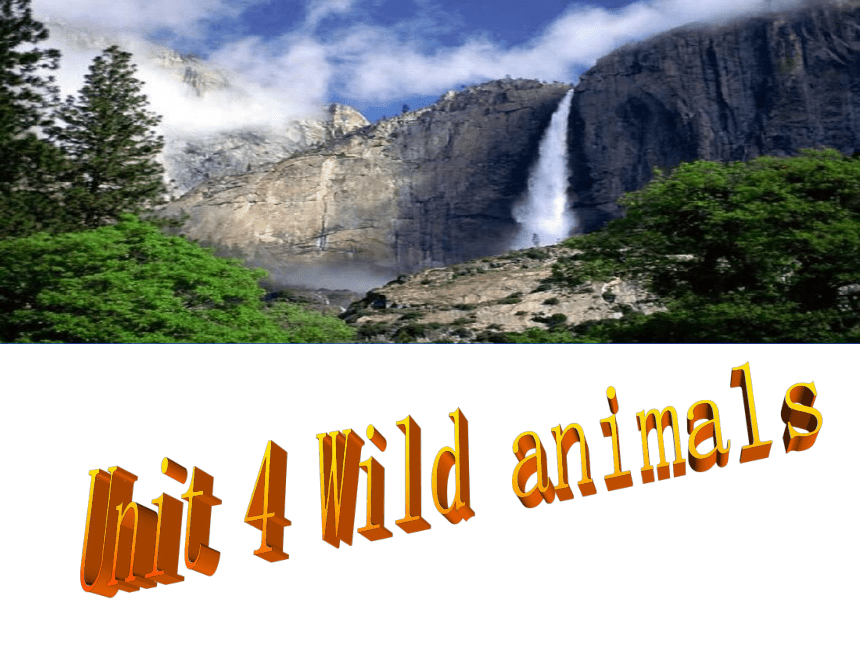 | |
| 格式 | zip | ||
| 文件大小 | 2.8MB | ||
| 资源类型 | 教案 | ||
| 版本资源 | 牛津译林版 | ||
| 科目 | 英语 | ||
| 更新时间 | 2012-11-08 12:03:57 | ||
图片预览

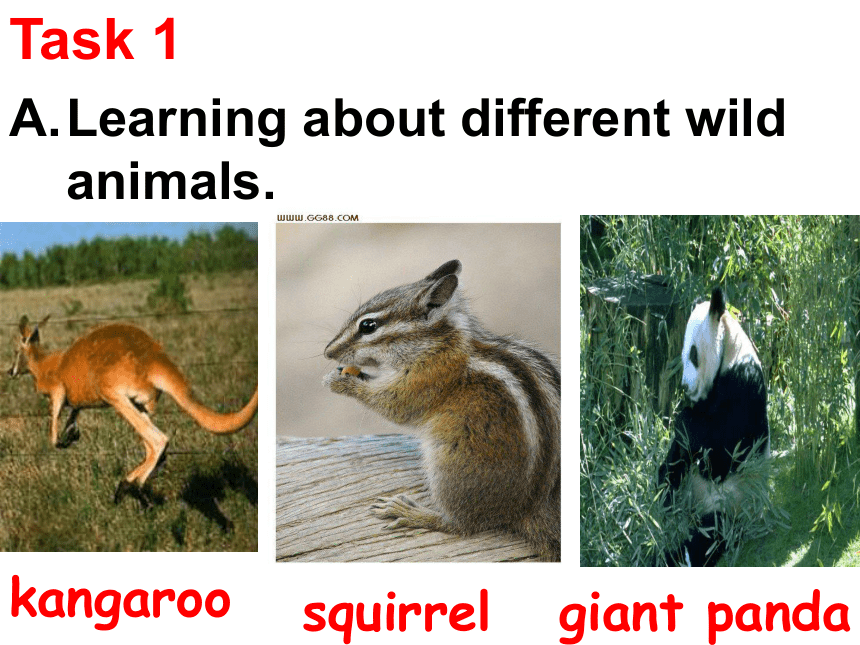

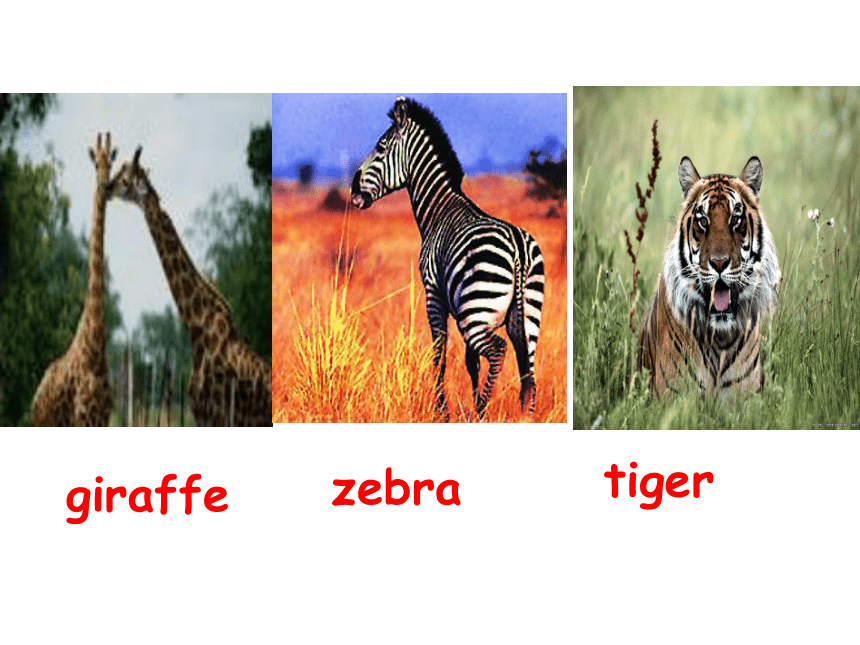
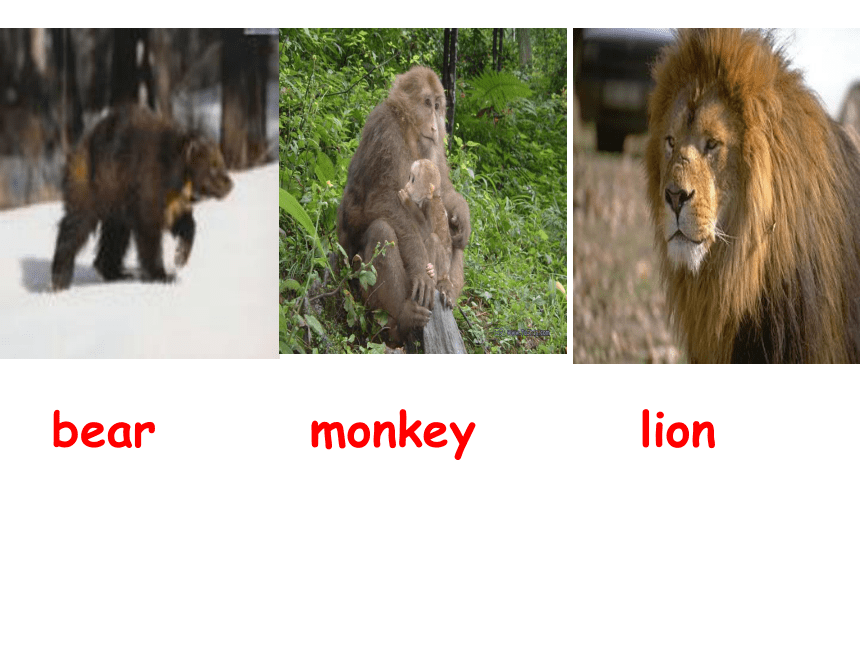
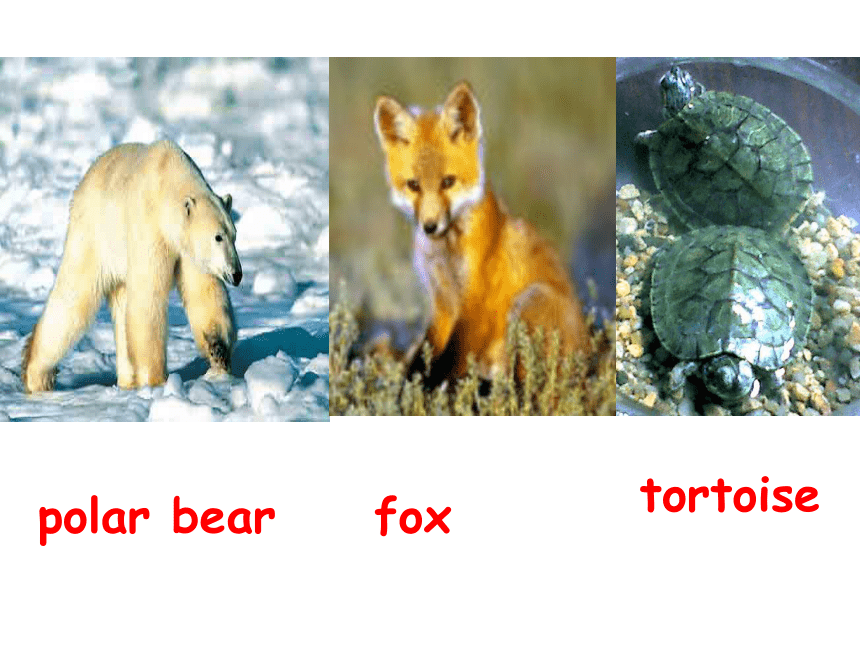
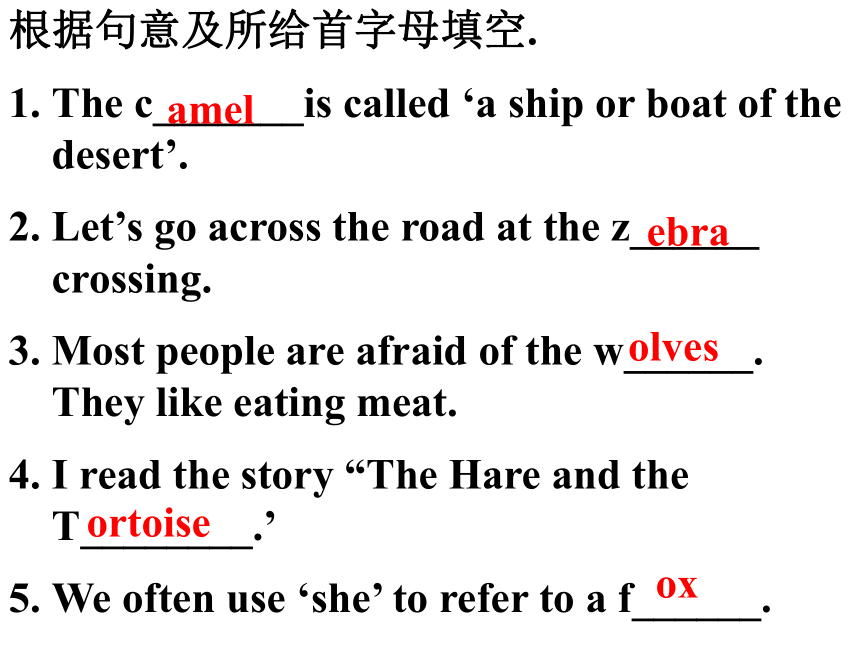
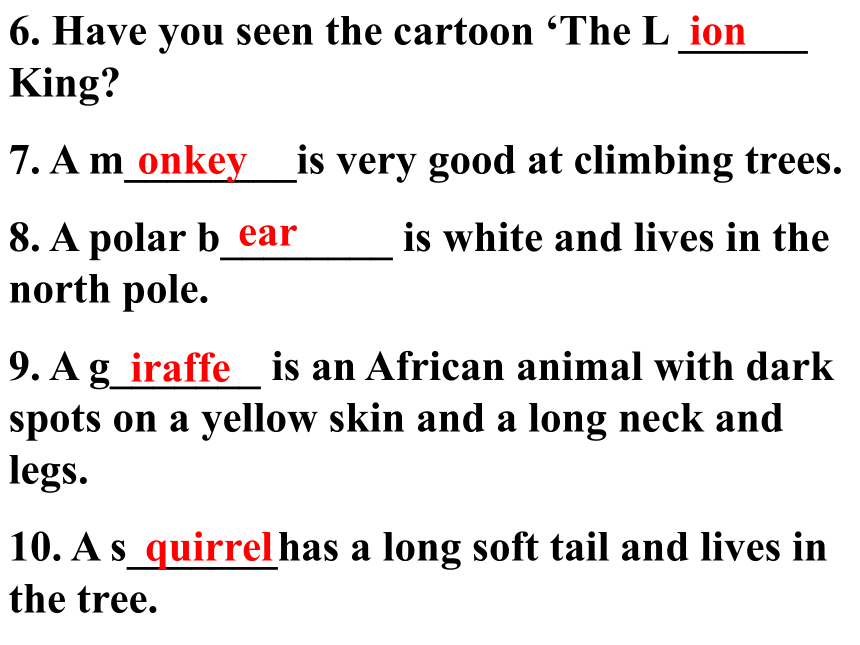
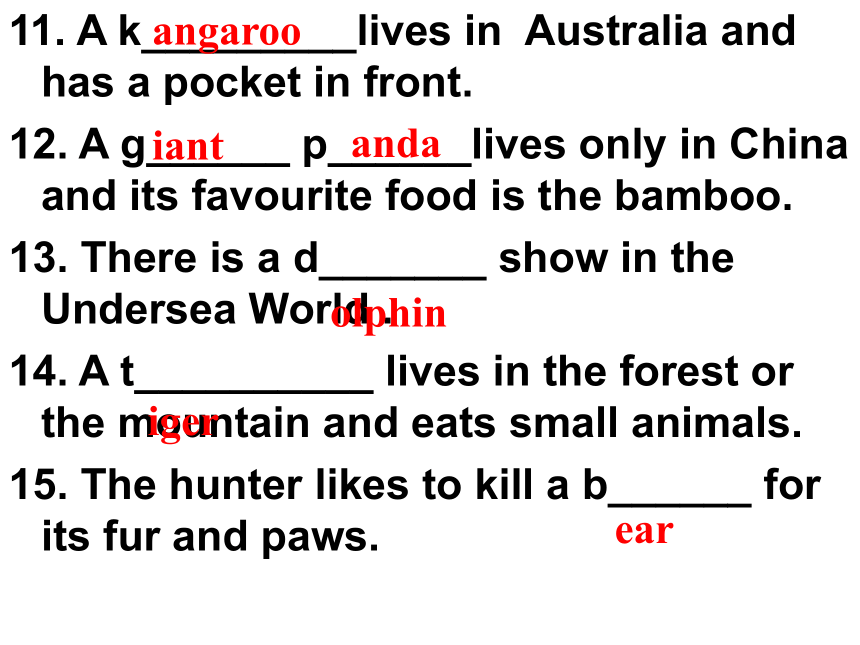
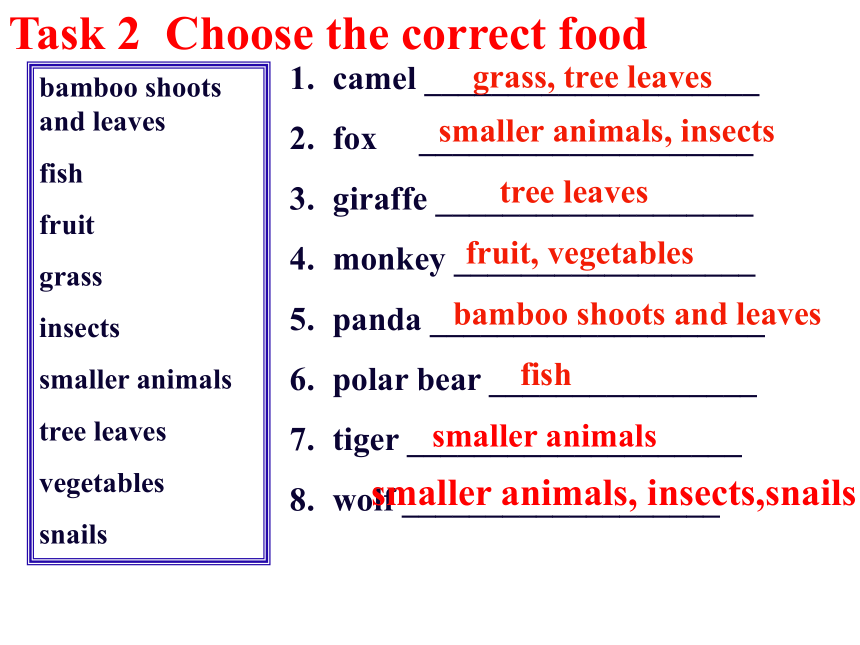
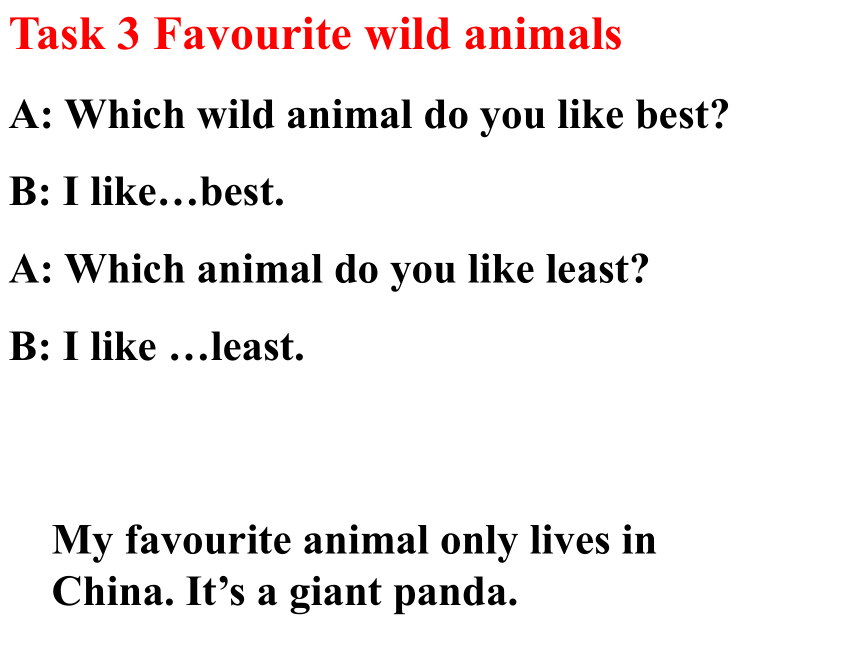
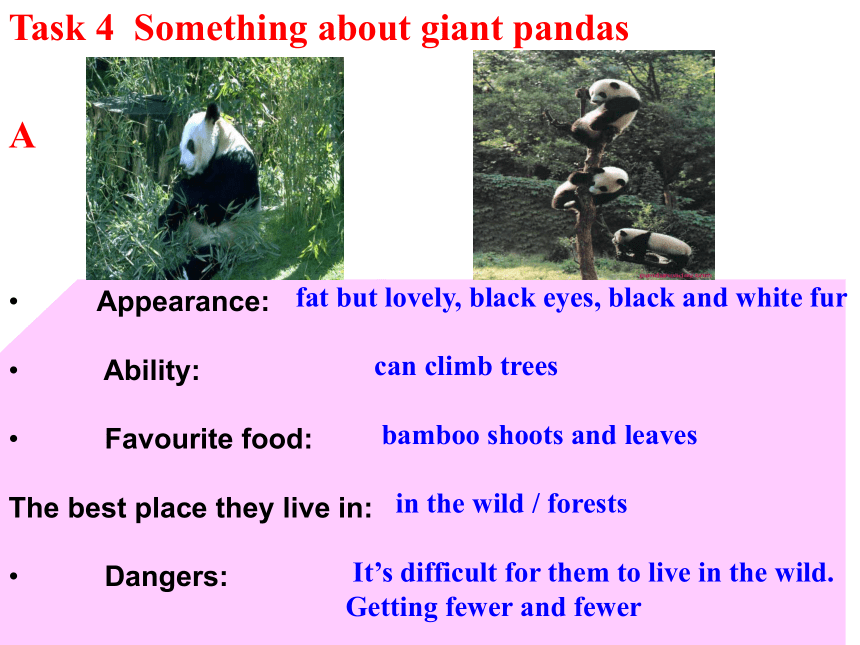
文档简介
课件45张PPT。 Unit 4 Wild animalsTask 1
Learning about different wild animals.
kangaroogiant pandasquirrelcameldolphin wolfgiraffezebratigerbearmonkeylionpolar bearfoxtortoise根据句意及所给首字母填空.
The c_______is called ‘a ship or boat of the desert’.
Let’s go across the road at the z______ crossing.
Most people are afraid of the w______. They like eating meat.
I read the story “The Hare and the T________.’
We often use ‘she’ to refer to a f______.amelebraolvesortoiseox6. Have you seen the cartoon ‘The L ______ King?
7. A m________is very good at climbing trees.
8. A polar b________ is white and lives in the north pole.
9. A g_______ is an African animal with dark spots on a yellow skin and a long neck and legs.
10. A s_______has a long soft tail and lives in the tree.iononkeyeariraffequirrel11. A k_________lives in Australia and has a pocket in front.
12. A g______ p______lives only in China and its favourite food is the bamboo.
13. There is a d_______ show in the Undersea World .
14. A t__________ lives in the forest or the mountain and eats small animals.
15. The hunter likes to kill a b______ for its fur and paws.
angarooiantandaolphinigerearbamboo shoots and leaves
fish
fruit
grass
insects
smaller animals
tree leaves
vegetables
snailscamel ____________________
fox ____________________
giraffe ___________________
monkey __________________
panda ____________________
polar bear ________________
tiger ____________________
wolf ___________________
grass, tree leavessmaller animals, insectstree leavesfruit, vegetablesbamboo shoots and leavesfishTask 2 Choose the correct food
smaller animalssmaller animals, insects,snailsTask 3 Favourite wild animals
A: Which wild animal do you like best?
B: I like…best.
A: Which animal do you like least?
B: I like …least.
My favourite animal only lives in China. It’s a giant panda. Appearance:
Ability:
Favourite food:
The best place they live in:
Dangers:fat but lovely, black eyes, black and white fur
can climb trees
bamboo shoots and leaves
in the wild / forests
It’s difficult for them to live in the wild.
Getting fewer and fewerTask 4 Something about giant pandasAThe growth of Xi WanggramsuptoawhitemousekilogramskilogramsoutsideforthefirsttimebambooshootsleavesgrewintolookafterherselfBIf hunters catch a giant panda, they will kill it for its fur.If farmers cut down trees and forests, giant pandas will have nowhere to live.Mothers often leave baby pandas for two whole days on their own . If people find baby pandas alone, they will often take them away.C giant pandas reserves bigger more reserves farmers to leave the giant pandas reservesMake ______________
____________________Build _____________Encourage______________________________________the actions we can take to protect giant pandas
D
After _______( read) the story of Xi Wang, we all know the ________(grow) of a giant panda. We also know the ________(important) of ________(protect) them. They are in great_________(dangerous).
We can take the _______(follow) actions. We must grow more _______(bamboo) and build more _______(reserve). We should encourage hunters ________(not kill) them and and encourage farmers ______(leave) the giant panda reserves.
readinggrowthimportanceprotectingdangerfollowingbamboosreservesnot to killto leaveE. Fill in blanks with proper forms. Task 5 Consolidation
1. 许多野生动物面临危险.
Many wild animals are in danger.
2. 一千克是1000克.
A kilogram is 1000 grams.
英语老师总是鼓励我课堂多发言.
The English teacher always encourages me to speak more in class.
4.我们一定要采取下列措施学好英语.
We must take the following actions to learn English well.
5.如果农民砍伐树木森林话, 大熊猫就无处可住了.
If farmers cut down trees and forests, giant pandas will have nowhere to live.
6. 在一开始时, 我并不喜欢数学.
At the very beginning, I didn’t like maths.
7.乌龟能活到150岁.
Tortoises can live up to 150 years . 8. 可惜得是, 对野生动物来说在野外生存很困难.
Sadly, it’s difficult for wild animals to survive in the wild.
9. 她第一次在学校图书馆借书.
She borrowed some books from the school library for the time.
10. 这些孩子将来要独自在外国生活.
These children will live in foreign countries on their own in the future.Love nature,love life.Grammar AUsing conditional sentences to talk about possible situations.
If引导的条件状语从句
What will happen if we grow more bamboo?
If we grow more bamboo, giant pandas will
have more food.What will you do if you go to the zoo?
We will watch the dolphin show if we
go to the zoo.What will a bear do if it is in danger?
If a bear is in danger, it will
attack people.What will a polar bear do if it is hungry?
If a polar bear is hungry , it will
catch fish from the water.What will elephants do if they are thirsty?
Elephants will walk till they find a river
if they are thirsty.What will tiger do if they live in the wild?
Tigers will hunt for their own food if they live in the wild.
What will male wolves do if there
is danger?
Male wolves will protect their families
if there is danger.1.If you eat my food, I won’t talk to you.
-----I won’t talk to you if you eat my food .
2.If I don’t have food, I will die.
-----I will die if I don’t have food.
一般现在时
从句一般将来时
主句Grammar (1) Work out the rule
1.定义:谈论到一个可能的行为会产生一个 可能的结果.
2.时态:if 引导的句子用一般现在时,主句用 一般将来(主将从现)
3. 句子的结构: A: 主句+if引导的从句.
(主句在前从句在后)
B: 引导的从句, +主句.
(从句在前主句在后,中间加逗号) 一.用所给的动词填空1. If he _______ (watch) the animal carefully, he ________(get) enough information.
2. I can’t finish the work if you_________ (not help) me.
3. If you don’t go there tomorrow, I ________
(not go), either.
4. ____________(not cross) the road if the light______ (be) red.
5. If a giant panda _______ (have ) no food, it _______ (die).
watcheswill getdon’t helpwon’t goDon’t crossishaswill die6. The baby panda ______ (live) on his own if his mother _____ (leave) him for two whole days.will liveleaves7. If we ____ (build) the giant panda reserves, we ____________ (encourage) them to leave.
8. If we _______ (not do) anything, soon there ______ (be) no pandas in the world.buildwill encouragedon’t dowill be二.Translations1. 如果你吃我的食物,我就不和你讲话;如果我不吃食物,我就会死;如果我死了,就没人照顾你了。
If you eat my food, I won’t talk to you.
If I don’t eat food, I will die. If I die, no one will look after you.
2. 如果明天不下雨,我就去公园.
I will go to the park if it doesn’t rain.
3. 如果他有更多的时间, 他就去观看海豚表演.
If he has more time, he will watch the dolphin show.
4. 如果我去世界公园, 我会了解很多有关世界名胜.
I will learn a lot about the world if I go to the World Park.
5. 如果人们发现小熊猫独自那儿, 他们会抱走他们.
If people find baby pandas alone, they will take them away.
6. 如果老虎生了孩子,他们会群居.
Tigers will live as a family if they have babies.Grammar BUse “because/ because of” to give reasons for something.
because/ because of Work out the ruleWhy did you go to the zoo yesterday?
----Because I wanted to see animals.
----Because of watching animal shows.
----Because of the wonderful show.
because引导原因状语从句
because of+名词/名词短语/宾格代词Practice1. Why does Daniel have poor eyesight?
2. Why did the students leave school early?
3. Why didn’t Jim come to school today?
4. Why should we prevent people cutting downs trees?
5. Why were the dolphins tired?
6. Why must we learn English well?
7.Why were you late for school this morning?
一.选用because/because of1. __________ it was blowing strongly, Millie closed all the windows.
2.Little Peter ran to the big tree ___________ the heavy rain.
3. Amy often goes to Beijing Zoo _________ she likes animals very much.
4. Pat has poor eyesight ___________ working on the computer too much at night.
5. The airport is closed _____________ the bad weather.Becausebecause ofbecausebecause ofbecause of二.改错My mother had a bad cold so she fell into the river on her way home.
Uncle Li had to walk home because of he lost his wallet.
All the plane in the airport can’t take off because the heavy fog.
I like reading books about animals because I will get lots of informations from books.
He got up late because of go to bed too late last night.
because去掉ofbecausebecause ofinformationgoing Appearance:
Ability:
Character:
Favourite food:
Danger:fat but lovely, black eyes, black and white fur
can climb trees
very quiet and peaceful
bamboo shoots and leaves
Hunters hunt them for their fur.
Farmers cut down trees and they have nowhere to live.
Their living places are becoming farmland. Report: Wolves are in dangergrey fur, not very bigAppearance:
Ability:
Character:
Food:
Danger:good eyesight, hearing and smellbe friendly; work as a team; never attack people; don’t kill for funanimals, insects, snails, vegetablesloss of living areas; no home;
no foodAppearance:
Ability:
Character:
Food:
Danger:yellow fur; bright eyesrun fast; be good at huntinglive alone; live as a familyother animalsHunters hunt them for their fur and bones.
( to make furs and medicine)Report: Bears are in danger.Appearance:
Ability:
Character:
Food:
Danger:
Big and strong, small eyes,
black or brown fur, sharp pawsCan walk upright, good at swimming
and climbing treesLike to move around in the daytime,
seldom hurt peoplesmall animals, nuts, honeyHunters hunt them for their fur and paws Sample writing
Elephants are very big and strong. They are grey and have long trunks and tusks.
Elephants have poor eyesight, but very good hearing and smell. They can lift heavy things and break down branches with their trunks.
AppearanceAbility Elephants are very friendly towards each other and towards their neighbours. Usually, they live in a group. Young male elephants don’t leave the group until they are about 12 years old.
Sadly, there are very few elephants in the world. Their number is getting smaller and smaller because their living areas are becoming farmland. If people keep taking their land, elephants will have nowhere to live. Also, people hunt them for their tusks. We must stop this. If we don’t take any action, there will be no elephants in the world.
Dangers and actionsCharacter
Learning about different wild animals.
kangaroogiant pandasquirrelcameldolphin wolfgiraffezebratigerbearmonkeylionpolar bearfoxtortoise根据句意及所给首字母填空.
The c_______is called ‘a ship or boat of the desert’.
Let’s go across the road at the z______ crossing.
Most people are afraid of the w______. They like eating meat.
I read the story “The Hare and the T________.’
We often use ‘she’ to refer to a f______.amelebraolvesortoiseox6. Have you seen the cartoon ‘The L ______ King?
7. A m________is very good at climbing trees.
8. A polar b________ is white and lives in the north pole.
9. A g_______ is an African animal with dark spots on a yellow skin and a long neck and legs.
10. A s_______has a long soft tail and lives in the tree.iononkeyeariraffequirrel11. A k_________lives in Australia and has a pocket in front.
12. A g______ p______lives only in China and its favourite food is the bamboo.
13. There is a d_______ show in the Undersea World .
14. A t__________ lives in the forest or the mountain and eats small animals.
15. The hunter likes to kill a b______ for its fur and paws.
angarooiantandaolphinigerearbamboo shoots and leaves
fish
fruit
grass
insects
smaller animals
tree leaves
vegetables
snailscamel ____________________
fox ____________________
giraffe ___________________
monkey __________________
panda ____________________
polar bear ________________
tiger ____________________
wolf ___________________
grass, tree leavessmaller animals, insectstree leavesfruit, vegetablesbamboo shoots and leavesfishTask 2 Choose the correct food
smaller animalssmaller animals, insects,snailsTask 3 Favourite wild animals
A: Which wild animal do you like best?
B: I like…best.
A: Which animal do you like least?
B: I like …least.
My favourite animal only lives in China. It’s a giant panda. Appearance:
Ability:
Favourite food:
The best place they live in:
Dangers:fat but lovely, black eyes, black and white fur
can climb trees
bamboo shoots and leaves
in the wild / forests
It’s difficult for them to live in the wild.
Getting fewer and fewerTask 4 Something about giant pandasAThe growth of Xi WanggramsuptoawhitemousekilogramskilogramsoutsideforthefirsttimebambooshootsleavesgrewintolookafterherselfBIf hunters catch a giant panda, they will kill it for its fur.If farmers cut down trees and forests, giant pandas will have nowhere to live.Mothers often leave baby pandas for two whole days on their own . If people find baby pandas alone, they will often take them away.C giant pandas reserves bigger more reserves farmers to leave the giant pandas reservesMake ______________
____________________Build _____________Encourage______________________________________the actions we can take to protect giant pandas
D
After _______( read) the story of Xi Wang, we all know the ________(grow) of a giant panda. We also know the ________(important) of ________(protect) them. They are in great_________(dangerous).
We can take the _______(follow) actions. We must grow more _______(bamboo) and build more _______(reserve). We should encourage hunters ________(not kill) them and and encourage farmers ______(leave) the giant panda reserves.
readinggrowthimportanceprotectingdangerfollowingbamboosreservesnot to killto leaveE. Fill in blanks with proper forms. Task 5 Consolidation
1. 许多野生动物面临危险.
Many wild animals are in danger.
2. 一千克是1000克.
A kilogram is 1000 grams.
英语老师总是鼓励我课堂多发言.
The English teacher always encourages me to speak more in class.
4.我们一定要采取下列措施学好英语.
We must take the following actions to learn English well.
5.如果农民砍伐树木森林话, 大熊猫就无处可住了.
If farmers cut down trees and forests, giant pandas will have nowhere to live.
6. 在一开始时, 我并不喜欢数学.
At the very beginning, I didn’t like maths.
7.乌龟能活到150岁.
Tortoises can live up to 150 years . 8. 可惜得是, 对野生动物来说在野外生存很困难.
Sadly, it’s difficult for wild animals to survive in the wild.
9. 她第一次在学校图书馆借书.
She borrowed some books from the school library for the time.
10. 这些孩子将来要独自在外国生活.
These children will live in foreign countries on their own in the future.Love nature,love life.Grammar AUsing conditional sentences to talk about possible situations.
If引导的条件状语从句
What will happen if we grow more bamboo?
If we grow more bamboo, giant pandas will
have more food.What will you do if you go to the zoo?
We will watch the dolphin show if we
go to the zoo.What will a bear do if it is in danger?
If a bear is in danger, it will
attack people.What will a polar bear do if it is hungry?
If a polar bear is hungry , it will
catch fish from the water.What will elephants do if they are thirsty?
Elephants will walk till they find a river
if they are thirsty.What will tiger do if they live in the wild?
Tigers will hunt for their own food if they live in the wild.
What will male wolves do if there
is danger?
Male wolves will protect their families
if there is danger.1.If you eat my food, I won’t talk to you.
-----I won’t talk to you if you eat my food .
2.If I don’t have food, I will die.
-----I will die if I don’t have food.
一般现在时
从句一般将来时
主句Grammar (1) Work out the rule
1.定义:谈论到一个可能的行为会产生一个 可能的结果.
2.时态:if 引导的句子用一般现在时,主句用 一般将来(主将从现)
3. 句子的结构: A: 主句+if引导的从句.
(主句在前从句在后)
B: 引导的从句, +主句.
(从句在前主句在后,中间加逗号) 一.用所给的动词填空1. If he _______ (watch) the animal carefully, he ________(get) enough information.
2. I can’t finish the work if you_________ (not help) me.
3. If you don’t go there tomorrow, I ________
(not go), either.
4. ____________(not cross) the road if the light______ (be) red.
5. If a giant panda _______ (have ) no food, it _______ (die).
watcheswill getdon’t helpwon’t goDon’t crossishaswill die6. The baby panda ______ (live) on his own if his mother _____ (leave) him for two whole days.will liveleaves7. If we ____ (build) the giant panda reserves, we ____________ (encourage) them to leave.
8. If we _______ (not do) anything, soon there ______ (be) no pandas in the world.buildwill encouragedon’t dowill be二.Translations1. 如果你吃我的食物,我就不和你讲话;如果我不吃食物,我就会死;如果我死了,就没人照顾你了。
If you eat my food, I won’t talk to you.
If I don’t eat food, I will die. If I die, no one will look after you.
2. 如果明天不下雨,我就去公园.
I will go to the park if it doesn’t rain.
3. 如果他有更多的时间, 他就去观看海豚表演.
If he has more time, he will watch the dolphin show.
4. 如果我去世界公园, 我会了解很多有关世界名胜.
I will learn a lot about the world if I go to the World Park.
5. 如果人们发现小熊猫独自那儿, 他们会抱走他们.
If people find baby pandas alone, they will take them away.
6. 如果老虎生了孩子,他们会群居.
Tigers will live as a family if they have babies.Grammar BUse “because/ because of” to give reasons for something.
because/ because of Work out the ruleWhy did you go to the zoo yesterday?
----Because I wanted to see animals.
----Because of watching animal shows.
----Because of the wonderful show.
because引导原因状语从句
because of+名词/名词短语/宾格代词Practice1. Why does Daniel have poor eyesight?
2. Why did the students leave school early?
3. Why didn’t Jim come to school today?
4. Why should we prevent people cutting downs trees?
5. Why were the dolphins tired?
6. Why must we learn English well?
7.Why were you late for school this morning?
一.选用because/because of1. __________ it was blowing strongly, Millie closed all the windows.
2.Little Peter ran to the big tree ___________ the heavy rain.
3. Amy often goes to Beijing Zoo _________ she likes animals very much.
4. Pat has poor eyesight ___________ working on the computer too much at night.
5. The airport is closed _____________ the bad weather.Becausebecause ofbecausebecause ofbecause of二.改错My mother had a bad cold so she fell into the river on her way home.
Uncle Li had to walk home because of he lost his wallet.
All the plane in the airport can’t take off because the heavy fog.
I like reading books about animals because I will get lots of informations from books.
He got up late because of go to bed too late last night.
because去掉ofbecausebecause ofinformationgoing Appearance:
Ability:
Character:
Favourite food:
Danger:fat but lovely, black eyes, black and white fur
can climb trees
very quiet and peaceful
bamboo shoots and leaves
Hunters hunt them for their fur.
Farmers cut down trees and they have nowhere to live.
Their living places are becoming farmland. Report: Wolves are in dangergrey fur, not very bigAppearance:
Ability:
Character:
Food:
Danger:good eyesight, hearing and smellbe friendly; work as a team; never attack people; don’t kill for funanimals, insects, snails, vegetablesloss of living areas; no home;
no foodAppearance:
Ability:
Character:
Food:
Danger:yellow fur; bright eyesrun fast; be good at huntinglive alone; live as a familyother animalsHunters hunt them for their fur and bones.
( to make furs and medicine)Report: Bears are in danger.Appearance:
Ability:
Character:
Food:
Danger:
Big and strong, small eyes,
black or brown fur, sharp pawsCan walk upright, good at swimming
and climbing treesLike to move around in the daytime,
seldom hurt peoplesmall animals, nuts, honeyHunters hunt them for their fur and paws Sample writing
Elephants are very big and strong. They are grey and have long trunks and tusks.
Elephants have poor eyesight, but very good hearing and smell. They can lift heavy things and break down branches with their trunks.
AppearanceAbility Elephants are very friendly towards each other and towards their neighbours. Usually, they live in a group. Young male elephants don’t leave the group until they are about 12 years old.
Sadly, there are very few elephants in the world. Their number is getting smaller and smaller because their living areas are becoming farmland. If people keep taking their land, elephants will have nowhere to live. Also, people hunt them for their tusks. We must stop this. If we don’t take any action, there will be no elephants in the world.
Dangers and actionsCharacter
